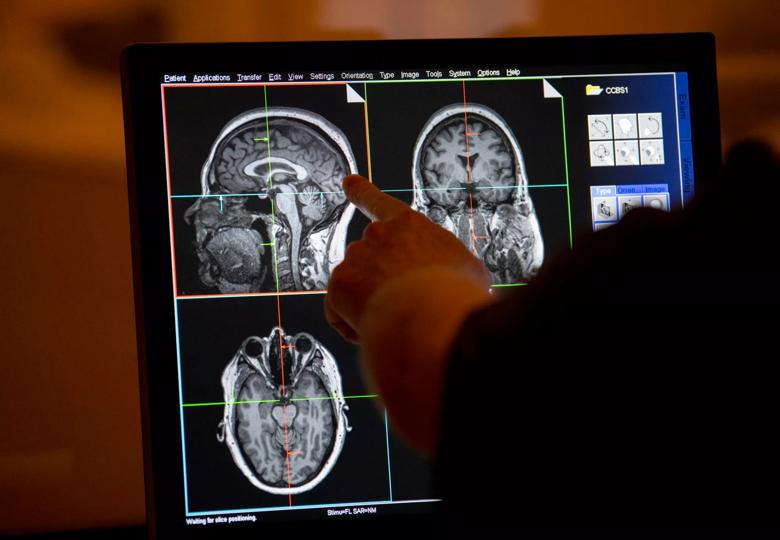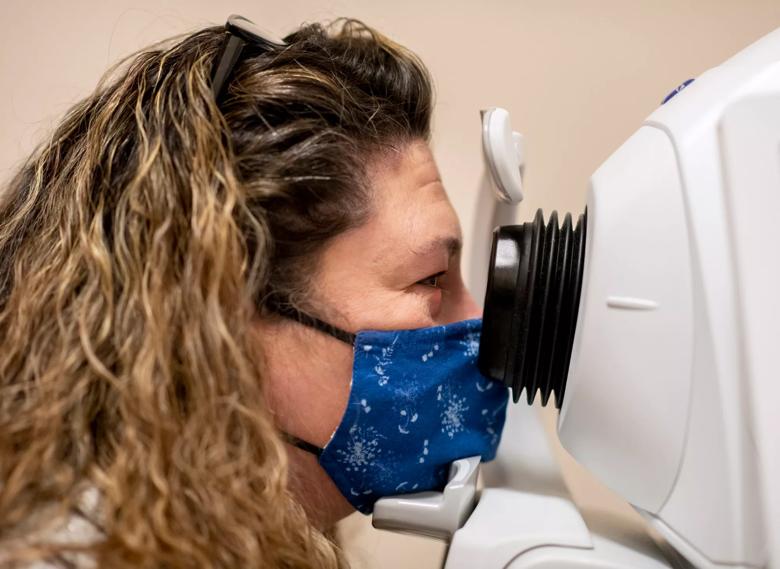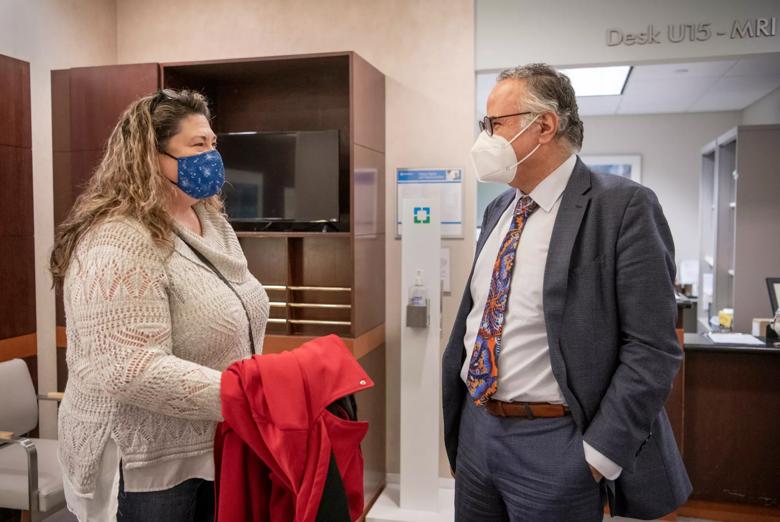The landmark study to follow up to 200,000 healthy participants over 20 years
Content is property of Cleveland Clinic and for news media use only.


Image content: This image is available to view online.
View image online (https://assets.clevelandclinic.org/transform/b1502bf4-fa5c-4abe-8262-f4b846b8d7a8/NEU-2642063_01-17-22_379_LDJ-scaled_jpg)
A researcher examines an MRI from a participant in the Cleveland Clinic Brain Study. (Photo courtesy of Cleveland Clinic.)
Cleveland Clinic has launched a landmark study to better understand why millions of people around the world suffer from brain diseases, with the goal of pinpointing disease biomarkers early, well before clinical symptoms present themselves.
The new Cleveland Clinic Brain Study – the largest clinical study ever for brain disease – will collect data from up to 200,000 neurologically healthy individuals over a 20-year period to identify brain disease biomarkers and targets for preventing and curing neurological disorders.
One in every six people around the globe has a neurological disease such as Alzheimer’s disease, Parkinson’s disease, multiple sclerosis, stroke or epilepsy. While the medical community has learned to manage some symptoms of brain disorders, it remains challenging to predict who will become sick or how to cure – or even stop the progression of – these diseases once they are diagnosed.
Led by Andre Machado, M.D., Ph.D., and Imad Najm, M.D., of Cleveland Clinic’s Neurological Institute, the longitudinal multi-year study is an enterprise-wide undertaking, enlisting a multidisciplinary team of physicians and scientists from across the global health system. The study launched at Cleveland Clinic’s main campus in Cleveland and will expand to additional Cleveland Clinic sites over time.

Image content: This image is available to view online.
View image online (https://assets.clevelandclinic.org/transform/837e1f01-326f-492b-9f9c-1e1521ebf3e1/NEU-2642063_01-17-22_003_LDJ-scaled_jpg)
Teresa Brewer of Bay Village undergoes optical coherence tomography of the retina as part of the Cleveland Clinic Brain Study. (Photo courtesy of Cleveland Clinic.)
“Disrupting neurological diseases is one of the greatest challenges of our time and motivates our clinicians and scientists every day,” said Dr. Machado, chair of the Neurological Institute and the Charles and Christine Carroll Family Endowed Chair in Functional Neurosurgery. “By launching a study of this magnitude, we have the potential to discover causes of neurological disorders and what happens before symptoms become obvious – the silent phase. Our hope is to change the course of neurodegeneration, with the long-term goal of curing diseases in their earliest stages, years before symptoms are even seen. Achieving this will be a great gift to our children and grandchildren. We can make neurological care better for the next generations.”
The initial phase of the study will enroll 10,000 volunteers over the first five years who will be examined and thoroughly investigated. This will include adults 50 years and older with no known neurological disorder or neurologically healthy adults age 20 and older who have a first-degree relative diagnosed with multiple sclerosis. Volunteers do not have to be current Cleveland Clinic patients. Participants will undergo yearly assessments including neurological examination, bloodwork, eye retina scans, brain MRIs, EEG and sleep studies and other cognitive function tests.
Using advanced computing tools, researchers will collect data points from the study volunteers. Collectively, these data points will form a trend line to capture the genetic risk factors, and invisible molecular, structural, neurophysiological and cognitive/memory changes in the brain over time. Researchers will seek “disease fingerprints” to help guide diagnostic and preventative medicines.

Image content: This image is available to view online.
View image online (https://assets.clevelandclinic.org/transform/e0fc214c-57fc-43e2-a9fa-4700b2d71c36/NEU-2642063_01-17-22_213_LDJ-scaled_jpg)
Imad Najm, M.D., co-principal investigator of the Cleveland Clinic Brain Study, talks with study volunteer Teresa Brewer of Bay Village. (Photo courtesy of Cleveland Clinic.)
“By researching at-risk healthy individuals over the course of 20 years, we will learn what is happening to the brain and body before a neurological disease is diagnosed. This research will help us understand the mechanisms of brain diseases and lead to the design of preventive treatment for neurological diseases. This is precision medicine in its best form,” said Dr. Najm, vice chair of the Neurological Institute for Strategy and Development and director of Cleveland Clinic’s Charles Shor Epilepsy Center and the Joseph H. and Ellen B. Thomas Endowed Chair in Epilepsy. “We’re building a foundation to screen one person at a time – potentially with something as routine as a blood test – to diagnose brain disease on the spot and prevent it from happening altogether.”
Philanthropic contributions are funding the study in part, with gifts of all sizes pooled to support the research. Philanthropy is vital in the mix of funding that is launching the research and moving it forward. To donate, visit: https://give.ccf.org/ClevelandClinicNeuro
For more information about the Cleveland Clinic Brain Study visit: https://my.clevelandclinic.org/departments/neurological/research-innovations/brain-study
Video content: This video is available to watch online.
View video online (https://www.youtube.com/embed/gn0K_i7Qsp8?feature=oembed&wmode=transparent)
Cleveland Clinic Launches First-of-its-Kind Brain Study
Cleveland Clinic is a nonprofit multispecialty academic medical center that integrates clinical and hospital care with research and education. Located in Cleveland, Ohio, it was founded in 1921 by four renowned physicians with a vision of providing outstanding patient care based upon the principles of cooperation, compassion and innovation. Cleveland Clinic has pioneered many medical breakthroughs, including coronary artery bypass surgery and the first face transplant in the United States. Cleveland Clinic is consistently recognized in the U.S. and throughout the world for its expertise and care. Among Cleveland Clinic’s 82,600 employees worldwide are more than 5,786 salaried physicians and researchers, and 20,700 registered nurses and advanced practice providers, representing 140 medical specialties and subspecialties. Cleveland Clinic is a 6,728-bed health system that includes a 173-acre main campus near downtown Cleveland, 23 hospitals, 280 outpatient facilities, including locations in northeast Ohio; Florida; Las Vegas, Nevada; Toronto, Canada; Abu Dhabi, UAE; and London, England. In 2024, there were 15.7 million outpatient encounters, 333,000 hospital admissions and observations, and 320,000 surgeries and procedures throughout Cleveland Clinic’s health system. Patients came for treatment from every state and 112 countries. Visit us at clevelandclinic.org. Follow us at x.com/CleClinicNews. News and resources are available at newsroom.clevelandclinic.org.
Editor’s Note: Cleveland Clinic News Service is available to provide broadcast-quality interviews and B-roll upon request.